MUBS-BAL Emotional Intelligence Management Workshop Report
VerifiedAdded on 2021/05/12
|6
|1621
|68
Report
AI Summary
This report from a MUBS-BAL Emotional Intelligence Management Workshop delves into the significance of emotional intelligence (EI) in the workplace, contrasting historical perspectives with contemporary understanding. It highlights the core components of EI, including self-awareness, self-management, social awareness, and relationship management, emphasizing their role in individual and team success. The report discusses the evolution from focusing solely on individual EI to recognizing the importance of team dynamics and group norms. It explores the traits of effective teams, such as trust, identity, and efficacy, and how EI norms foster these traits, leading to improved communication, creativity, and productivity. The report also examines the three levels of emotional interaction: individual, team, and cross-boundary, stressing the need for EI at each level to enhance relationships and achieve organizational goals. It concludes by underscoring the importance of assessment and predictability of emotional intelligence for organizational success and job satisfaction.
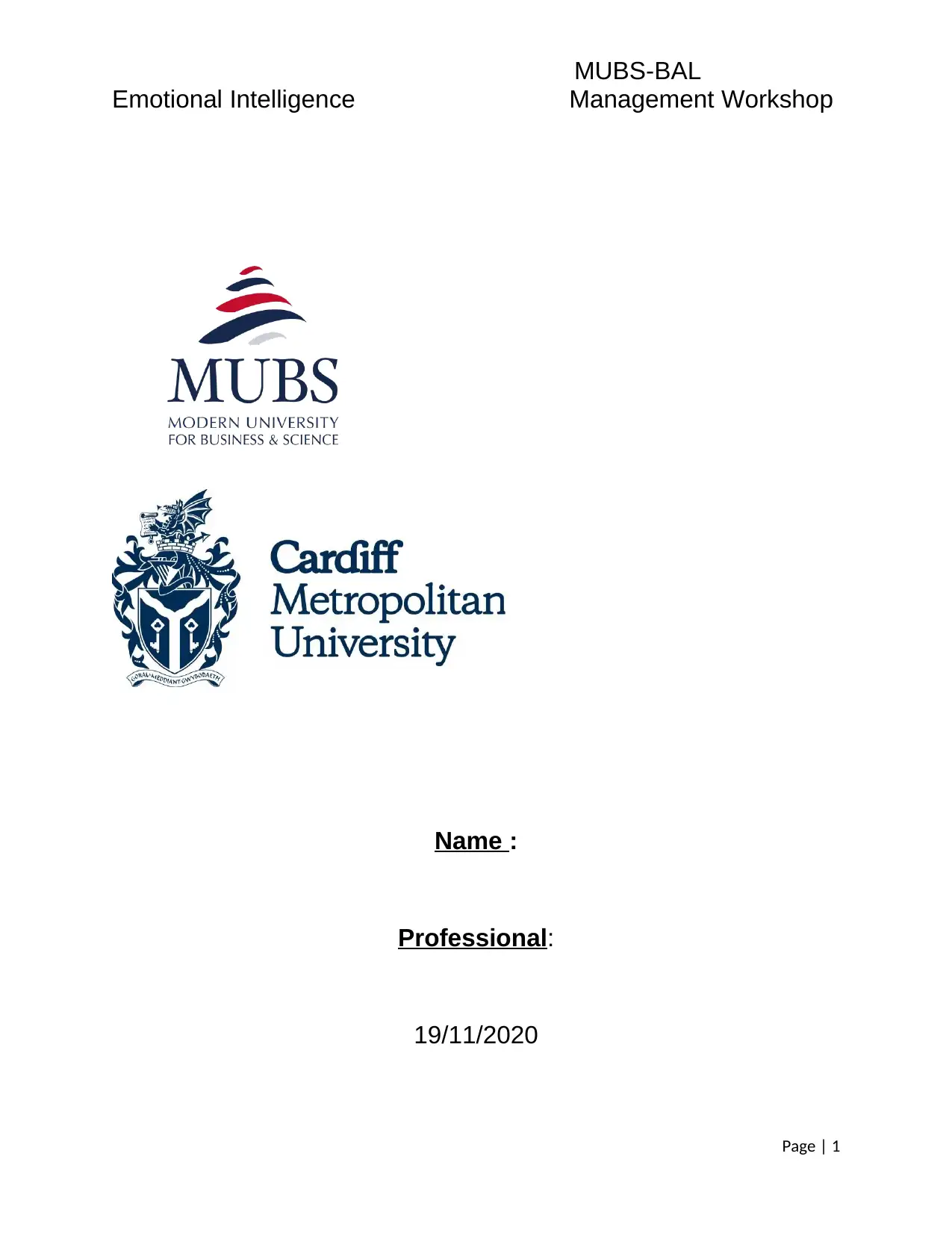
MUBS-BAL
Emotional Intelligence Management Workshop
Name :
Professional:
19/11/2020
Page | 1
Emotional Intelligence Management Workshop
Name :
Professional:
19/11/2020
Page | 1
Paraphrase This Document
Need a fresh take? Get an instant paraphrase of this document with our AI Paraphraser
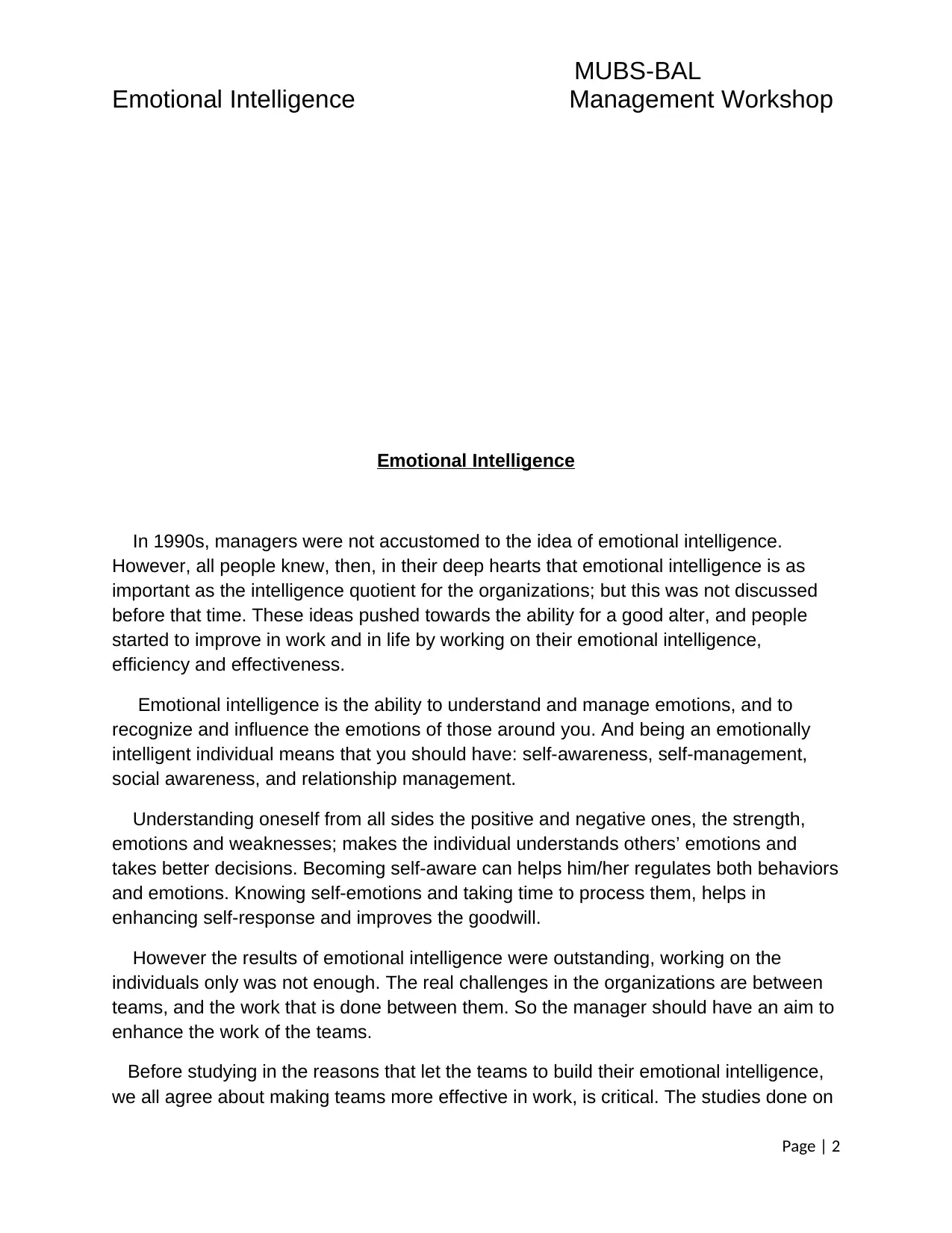
MUBS-BAL
Emotional Intelligence Management Workshop
Emotional Intelligence
In 1990s, managers were not accustomed to the idea of emotional intelligence.
However, all people knew, then, in their deep hearts that emotional intelligence is as
important as the intelligence quotient for the organizations; but this was not discussed
before that time. These ideas pushed towards the ability for a good alter, and people
started to improve in work and in life by working on their emotional intelligence,
efficiency and effectiveness.
Emotional intelligence is the ability to understand and manage emotions, and to
recognize and influence the emotions of those around you. And being an emotionally
intelligent individual means that you should have: self-awareness, self-management,
social awareness, and relationship management.
Understanding oneself from all sides the positive and negative ones, the strength,
emotions and weaknesses; makes the individual understands others’ emotions and
takes better decisions. Becoming self-aware can helps him/her regulates both behaviors
and emotions. Knowing self-emotions and taking time to process them, helps in
enhancing self-response and improves the goodwill.
However the results of emotional intelligence were outstanding, working on the
individuals only was not enough. The real challenges in the organizations are between
teams, and the work that is done between them. So the manager should have an aim to
enhance the work of the teams.
Before studying in the reasons that let the teams to build their emotional intelligence,
we all agree about making teams more effective in work, is critical. The studies done on
Page | 2
Emotional Intelligence Management Workshop
Emotional Intelligence
In 1990s, managers were not accustomed to the idea of emotional intelligence.
However, all people knew, then, in their deep hearts that emotional intelligence is as
important as the intelligence quotient for the organizations; but this was not discussed
before that time. These ideas pushed towards the ability for a good alter, and people
started to improve in work and in life by working on their emotional intelligence,
efficiency and effectiveness.
Emotional intelligence is the ability to understand and manage emotions, and to
recognize and influence the emotions of those around you. And being an emotionally
intelligent individual means that you should have: self-awareness, self-management,
social awareness, and relationship management.
Understanding oneself from all sides the positive and negative ones, the strength,
emotions and weaknesses; makes the individual understands others’ emotions and
takes better decisions. Becoming self-aware can helps him/her regulates both behaviors
and emotions. Knowing self-emotions and taking time to process them, helps in
enhancing self-response and improves the goodwill.
However the results of emotional intelligence were outstanding, working on the
individuals only was not enough. The real challenges in the organizations are between
teams, and the work that is done between them. So the manager should have an aim to
enhance the work of the teams.
Before studying in the reasons that let the teams to build their emotional intelligence,
we all agree about making teams more effective in work, is critical. The studies done on
Page | 2
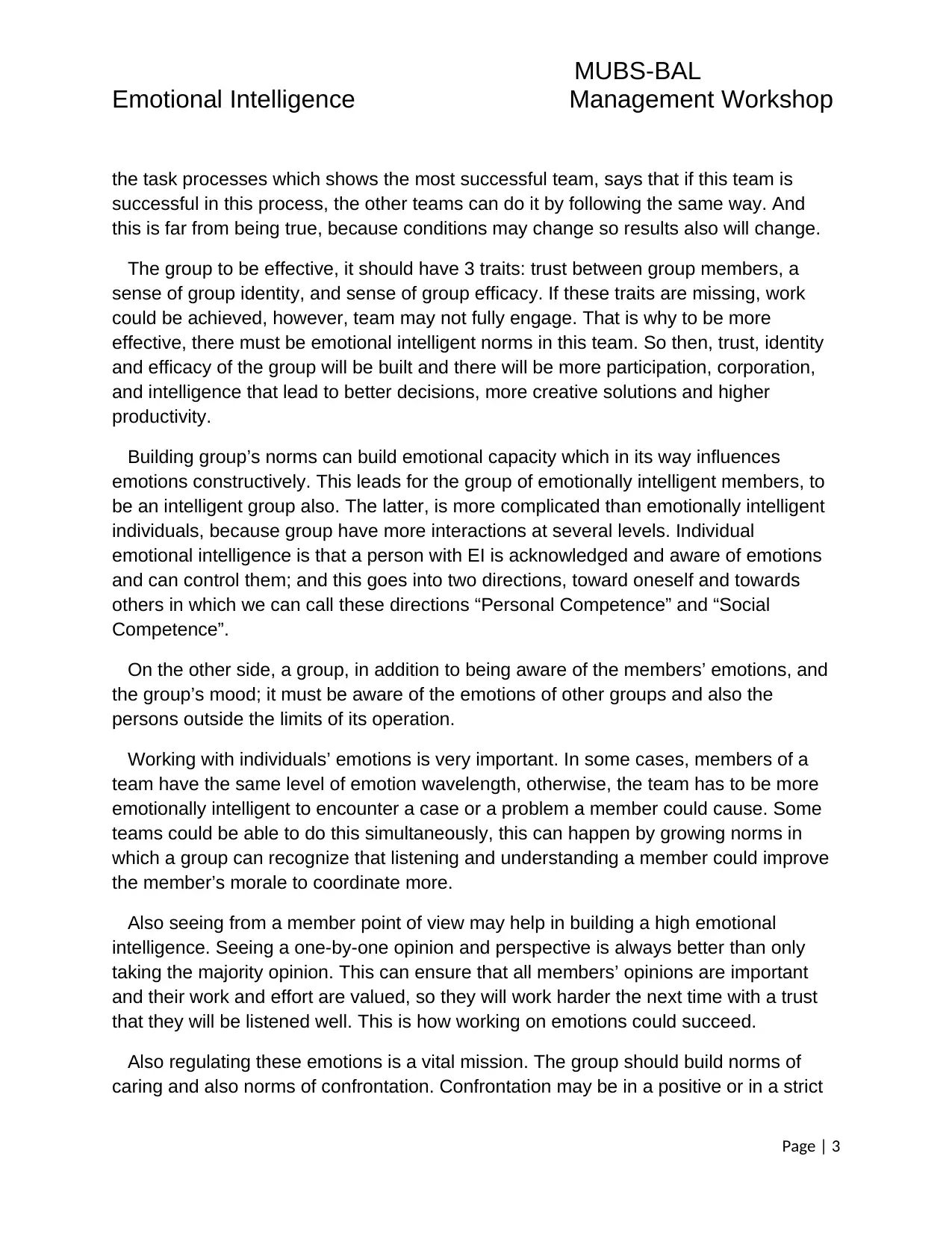
MUBS-BAL
Emotional Intelligence Management Workshop
the task processes which shows the most successful team, says that if this team is
successful in this process, the other teams can do it by following the same way. And
this is far from being true, because conditions may change so results also will change.
The group to be effective, it should have 3 traits: trust between group members, a
sense of group identity, and sense of group efficacy. If these traits are missing, work
could be achieved, however, team may not fully engage. That is why to be more
effective, there must be emotional intelligent norms in this team. So then, trust, identity
and efficacy of the group will be built and there will be more participation, corporation,
and intelligence that lead to better decisions, more creative solutions and higher
productivity.
Building group’s norms can build emotional capacity which in its way influences
emotions constructively. This leads for the group of emotionally intelligent members, to
be an intelligent group also. The latter, is more complicated than emotionally intelligent
individuals, because group have more interactions at several levels. Individual
emotional intelligence is that a person with EI is acknowledged and aware of emotions
and can control them; and this goes into two directions, toward oneself and towards
others in which we can call these directions “Personal Competence” and “Social
Competence”.
On the other side, a group, in addition to being aware of the members’ emotions, and
the group’s mood; it must be aware of the emotions of other groups and also the
persons outside the limits of its operation.
Working with individuals’ emotions is very important. In some cases, members of a
team have the same level of emotion wavelength, otherwise, the team has to be more
emotionally intelligent to encounter a case or a problem a member could cause. Some
teams could be able to do this simultaneously, this can happen by growing norms in
which a group can recognize that listening and understanding a member could improve
the member’s morale to coordinate more.
Also seeing from a member point of view may help in building a high emotional
intelligence. Seeing a one-by-one opinion and perspective is always better than only
taking the majority opinion. This can ensure that all members’ opinions are important
and their work and effort are valued, so they will work harder the next time with a trust
that they will be listened well. This is how working on emotions could succeed.
Also regulating these emotions is a vital mission. The group should build norms of
caring and also norms of confrontation. Confrontation may be in a positive or in a strict
Page | 3
Emotional Intelligence Management Workshop
the task processes which shows the most successful team, says that if this team is
successful in this process, the other teams can do it by following the same way. And
this is far from being true, because conditions may change so results also will change.
The group to be effective, it should have 3 traits: trust between group members, a
sense of group identity, and sense of group efficacy. If these traits are missing, work
could be achieved, however, team may not fully engage. That is why to be more
effective, there must be emotional intelligent norms in this team. So then, trust, identity
and efficacy of the group will be built and there will be more participation, corporation,
and intelligence that lead to better decisions, more creative solutions and higher
productivity.
Building group’s norms can build emotional capacity which in its way influences
emotions constructively. This leads for the group of emotionally intelligent members, to
be an intelligent group also. The latter, is more complicated than emotionally intelligent
individuals, because group have more interactions at several levels. Individual
emotional intelligence is that a person with EI is acknowledged and aware of emotions
and can control them; and this goes into two directions, toward oneself and towards
others in which we can call these directions “Personal Competence” and “Social
Competence”.
On the other side, a group, in addition to being aware of the members’ emotions, and
the group’s mood; it must be aware of the emotions of other groups and also the
persons outside the limits of its operation.
Working with individuals’ emotions is very important. In some cases, members of a
team have the same level of emotion wavelength, otherwise, the team has to be more
emotionally intelligent to encounter a case or a problem a member could cause. Some
teams could be able to do this simultaneously, this can happen by growing norms in
which a group can recognize that listening and understanding a member could improve
the member’s morale to coordinate more.
Also seeing from a member point of view may help in building a high emotional
intelligence. Seeing a one-by-one opinion and perspective is always better than only
taking the majority opinion. This can ensure that all members’ opinions are important
and their work and effort are valued, so they will work harder the next time with a trust
that they will be listened well. This is how working on emotions could succeed.
Also regulating these emotions is a vital mission. The group should build norms of
caring and also norms of confrontation. Confrontation may be in a positive or in a strict
Page | 3
⊘ This is a preview!⊘
Do you want full access?
Subscribe today to unlock all pages.

Trusted by 1+ million students worldwide
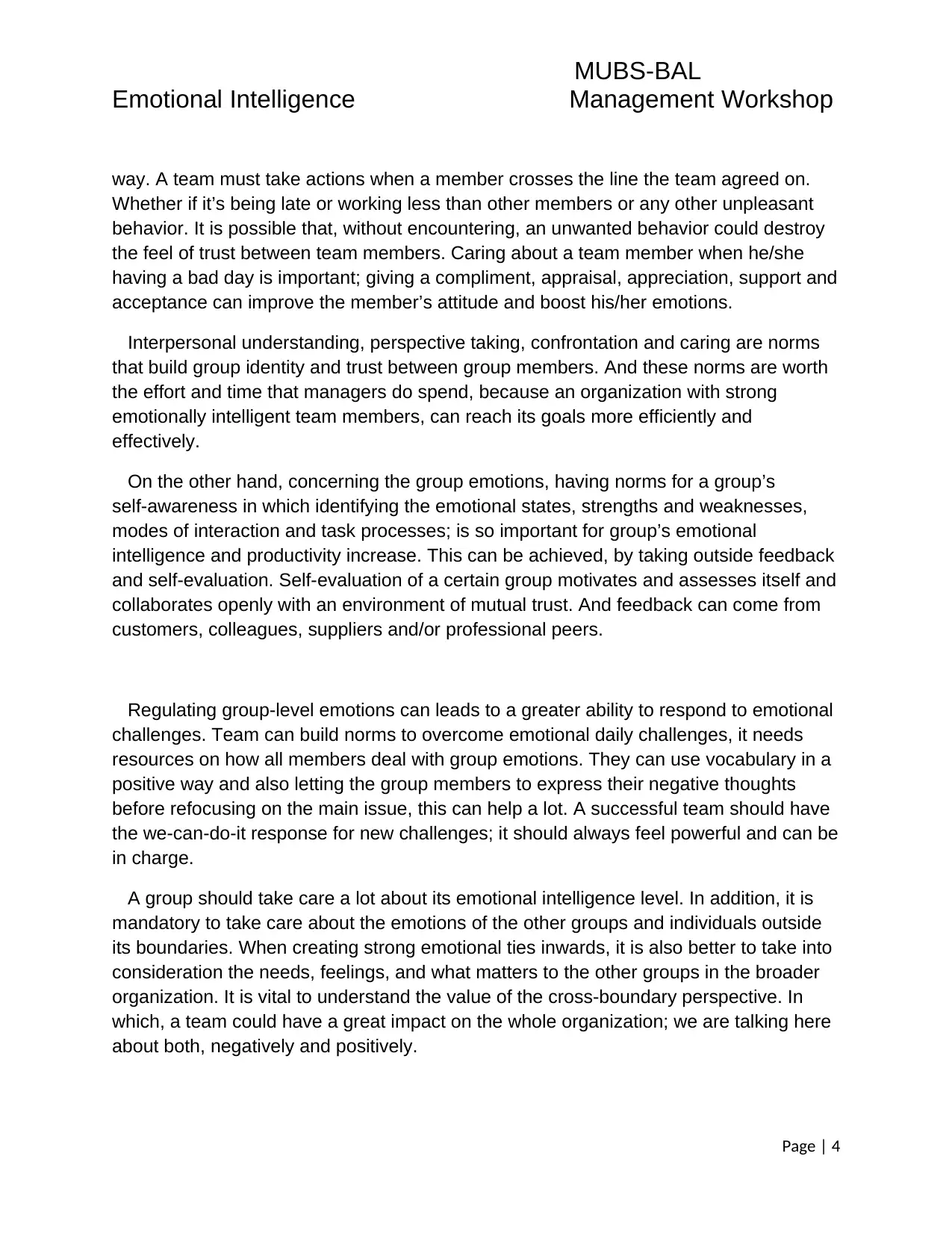
MUBS-BAL
Emotional Intelligence Management Workshop
way. A team must take actions when a member crosses the line the team agreed on.
Whether if it’s being late or working less than other members or any other unpleasant
behavior. It is possible that, without encountering, an unwanted behavior could destroy
the feel of trust between team members. Caring about a team member when he/she
having a bad day is important; giving a compliment, appraisal, appreciation, support and
acceptance can improve the member’s attitude and boost his/her emotions.
Interpersonal understanding, perspective taking, confrontation and caring are norms
that build group identity and trust between group members. And these norms are worth
the effort and time that managers do spend, because an organization with strong
emotionally intelligent team members, can reach its goals more efficiently and
effectively.
On the other hand, concerning the group emotions, having norms for a group’s
self-awareness in which identifying the emotional states, strengths and weaknesses,
modes of interaction and task processes; is so important for group’s emotional
intelligence and productivity increase. This can be achieved, by taking outside feedback
and self-evaluation. Self-evaluation of a certain group motivates and assesses itself and
collaborates openly with an environment of mutual trust. And feedback can come from
customers, colleagues, suppliers and/or professional peers.
Regulating group-level emotions can leads to a greater ability to respond to emotional
challenges. Team can build norms to overcome emotional daily challenges, it needs
resources on how all members deal with group emotions. They can use vocabulary in a
positive way and also letting the group members to express their negative thoughts
before refocusing on the main issue, this can help a lot. A successful team should have
the we-can-do-it response for new challenges; it should always feel powerful and can be
in charge.
A group should take care a lot about its emotional intelligence level. In addition, it is
mandatory to take care about the emotions of the other groups and individuals outside
its boundaries. When creating strong emotional ties inwards, it is also better to take into
consideration the needs, feelings, and what matters to the other groups in the broader
organization. It is vital to understand the value of the cross-boundary perspective. In
which, a team could have a great impact on the whole organization; we are talking here
about both, negatively and positively.
Page | 4
Emotional Intelligence Management Workshop
way. A team must take actions when a member crosses the line the team agreed on.
Whether if it’s being late or working less than other members or any other unpleasant
behavior. It is possible that, without encountering, an unwanted behavior could destroy
the feel of trust between team members. Caring about a team member when he/she
having a bad day is important; giving a compliment, appraisal, appreciation, support and
acceptance can improve the member’s attitude and boost his/her emotions.
Interpersonal understanding, perspective taking, confrontation and caring are norms
that build group identity and trust between group members. And these norms are worth
the effort and time that managers do spend, because an organization with strong
emotionally intelligent team members, can reach its goals more efficiently and
effectively.
On the other hand, concerning the group emotions, having norms for a group’s
self-awareness in which identifying the emotional states, strengths and weaknesses,
modes of interaction and task processes; is so important for group’s emotional
intelligence and productivity increase. This can be achieved, by taking outside feedback
and self-evaluation. Self-evaluation of a certain group motivates and assesses itself and
collaborates openly with an environment of mutual trust. And feedback can come from
customers, colleagues, suppliers and/or professional peers.
Regulating group-level emotions can leads to a greater ability to respond to emotional
challenges. Team can build norms to overcome emotional daily challenges, it needs
resources on how all members deal with group emotions. They can use vocabulary in a
positive way and also letting the group members to express their negative thoughts
before refocusing on the main issue, this can help a lot. A successful team should have
the we-can-do-it response for new challenges; it should always feel powerful and can be
in charge.
A group should take care a lot about its emotional intelligence level. In addition, it is
mandatory to take care about the emotions of the other groups and individuals outside
its boundaries. When creating strong emotional ties inwards, it is also better to take into
consideration the needs, feelings, and what matters to the other groups in the broader
organization. It is vital to understand the value of the cross-boundary perspective. In
which, a team could have a great impact on the whole organization; we are talking here
about both, negatively and positively.
Page | 4
Paraphrase This Document
Need a fresh take? Get an instant paraphrase of this document with our AI Paraphraser
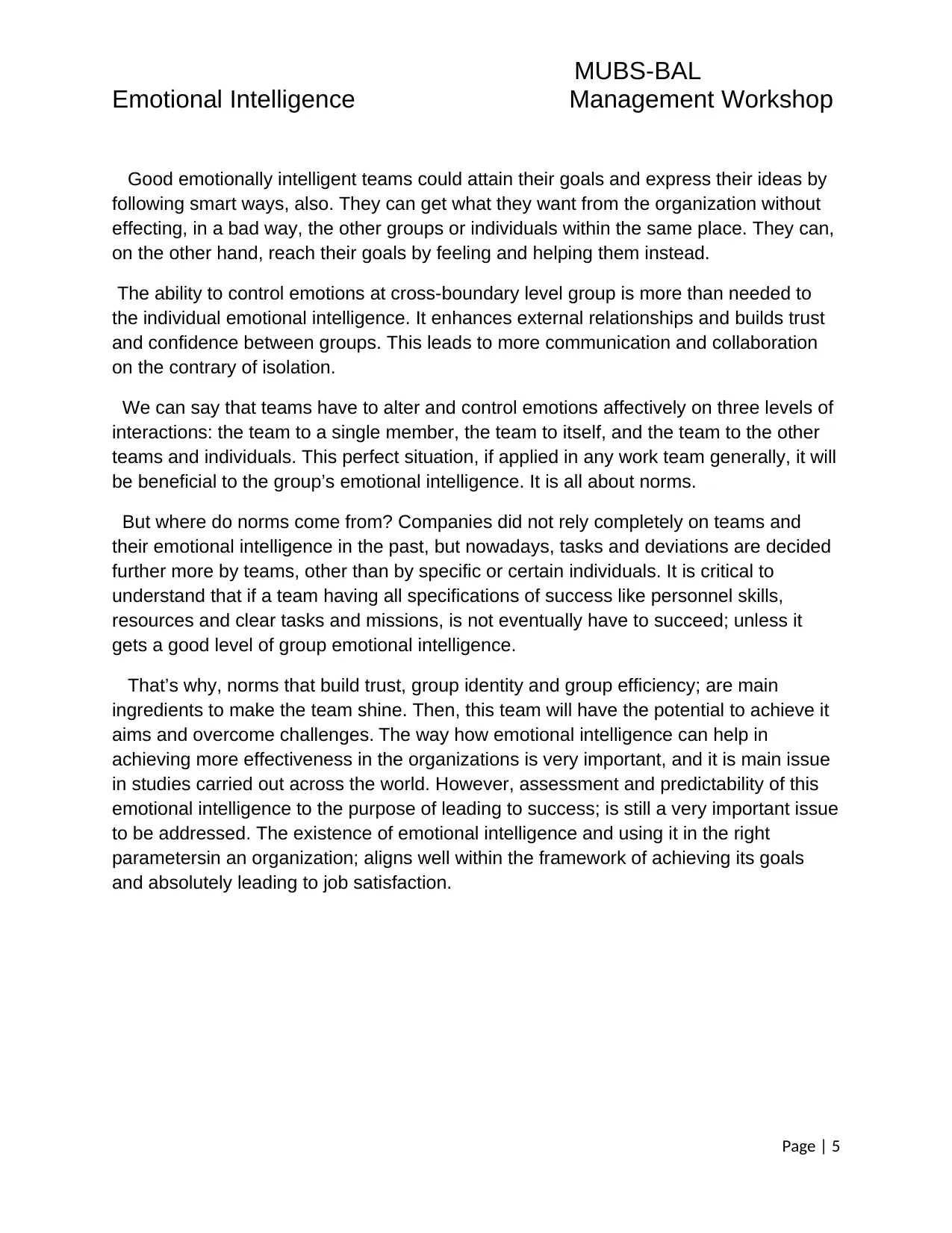
MUBS-BAL
Emotional Intelligence Management Workshop
Good emotionally intelligent teams could attain their goals and express their ideas by
following smart ways, also. They can get what they want from the organization without
effecting, in a bad way, the other groups or individuals within the same place. They can,
on the other hand, reach their goals by feeling and helping them instead.
The ability to control emotions at cross-boundary level group is more than needed to
the individual emotional intelligence. It enhances external relationships and builds trust
and confidence between groups. This leads to more communication and collaboration
on the contrary of isolation.
We can say that teams have to alter and control emotions affectively on three levels of
interactions: the team to a single member, the team to itself, and the team to the other
teams and individuals. This perfect situation, if applied in any work team generally, it will
be beneficial to the group’s emotional intelligence. It is all about norms.
But where do norms come from? Companies did not rely completely on teams and
their emotional intelligence in the past, but nowadays, tasks and deviations are decided
further more by teams, other than by specific or certain individuals. It is critical to
understand that if a team having all specifications of success like personnel skills,
resources and clear tasks and missions, is not eventually have to succeed; unless it
gets a good level of group emotional intelligence.
That’s why, norms that build trust, group identity and group efficiency; are main
ingredients to make the team shine. Then, this team will have the potential to achieve it
aims and overcome challenges. The way how emotional intelligence can help in
achieving more effectiveness in the organizations is very important, and it is main issue
in studies carried out across the world. However, assessment and predictability of this
emotional intelligence to the purpose of leading to success; is still a very important issue
to be addressed. The existence of emotional intelligence and using it in the right
parametersin an organization; aligns well within the framework of achieving its goals
and absolutely leading to job satisfaction.
Page | 5
Emotional Intelligence Management Workshop
Good emotionally intelligent teams could attain their goals and express their ideas by
following smart ways, also. They can get what they want from the organization without
effecting, in a bad way, the other groups or individuals within the same place. They can,
on the other hand, reach their goals by feeling and helping them instead.
The ability to control emotions at cross-boundary level group is more than needed to
the individual emotional intelligence. It enhances external relationships and builds trust
and confidence between groups. This leads to more communication and collaboration
on the contrary of isolation.
We can say that teams have to alter and control emotions affectively on three levels of
interactions: the team to a single member, the team to itself, and the team to the other
teams and individuals. This perfect situation, if applied in any work team generally, it will
be beneficial to the group’s emotional intelligence. It is all about norms.
But where do norms come from? Companies did not rely completely on teams and
their emotional intelligence in the past, but nowadays, tasks and deviations are decided
further more by teams, other than by specific or certain individuals. It is critical to
understand that if a team having all specifications of success like personnel skills,
resources and clear tasks and missions, is not eventually have to succeed; unless it
gets a good level of group emotional intelligence.
That’s why, norms that build trust, group identity and group efficiency; are main
ingredients to make the team shine. Then, this team will have the potential to achieve it
aims and overcome challenges. The way how emotional intelligence can help in
achieving more effectiveness in the organizations is very important, and it is main issue
in studies carried out across the world. However, assessment and predictability of this
emotional intelligence to the purpose of leading to success; is still a very important issue
to be addressed. The existence of emotional intelligence and using it in the right
parametersin an organization; aligns well within the framework of achieving its goals
and absolutely leading to job satisfaction.
Page | 5
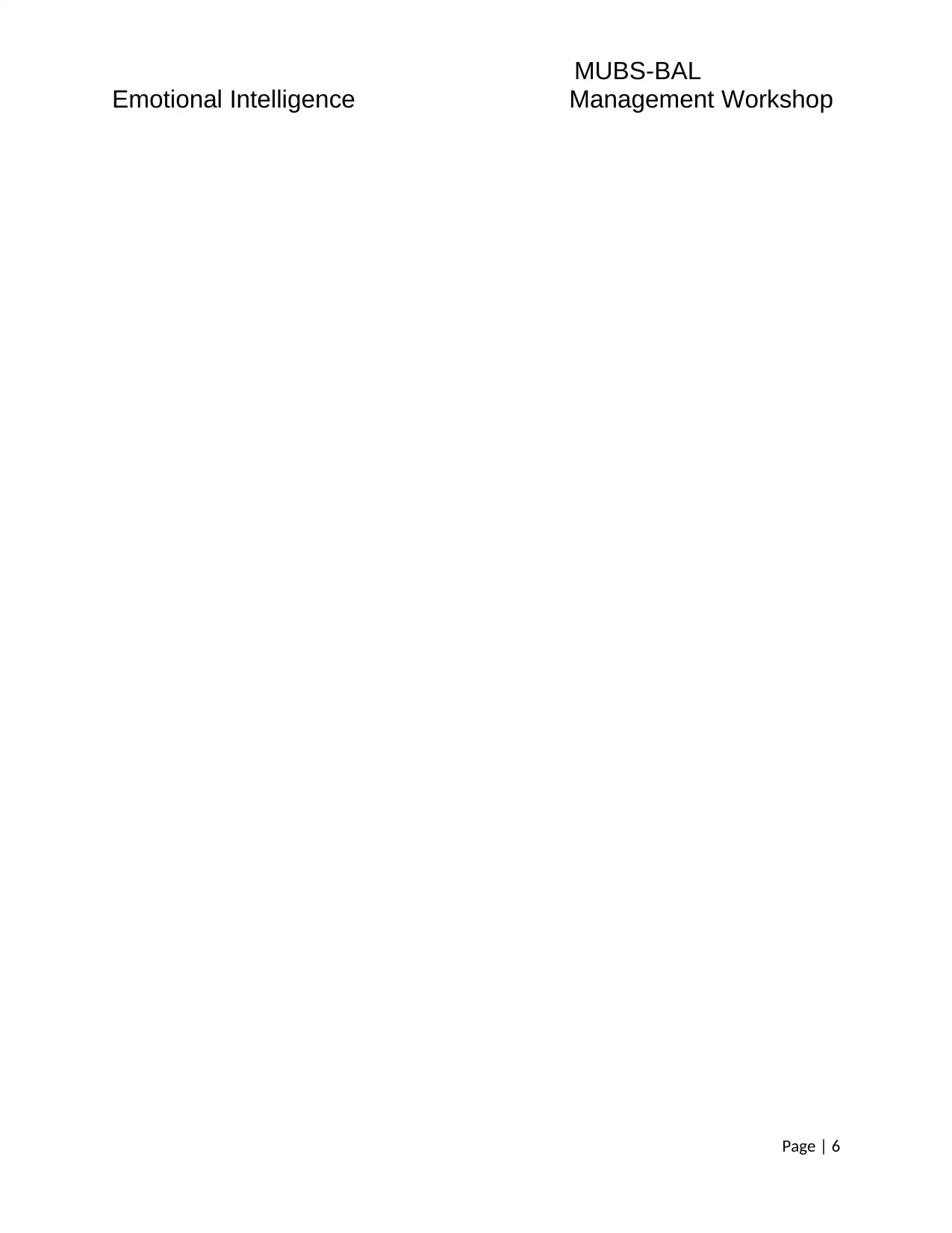
MUBS-BAL
Emotional Intelligence Management Workshop
Page | 6
Emotional Intelligence Management Workshop
Page | 6
⊘ This is a preview!⊘
Do you want full access?
Subscribe today to unlock all pages.

Trusted by 1+ million students worldwide
1 out of 6
Related Documents
Your All-in-One AI-Powered Toolkit for Academic Success.
+13062052269
info@desklib.com
Available 24*7 on WhatsApp / Email
![[object Object]](/_next/static/media/star-bottom.7253800d.svg)
Unlock your academic potential
Copyright © 2020–2025 A2Z Services. All Rights Reserved. Developed and managed by ZUCOL.





